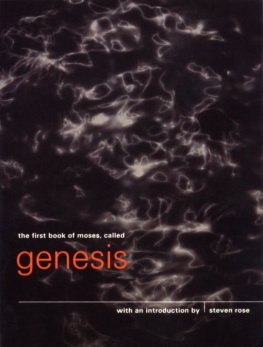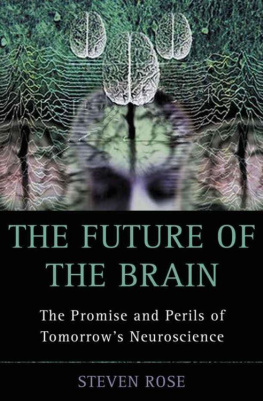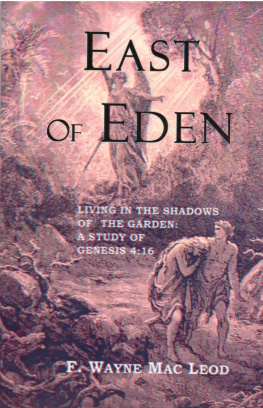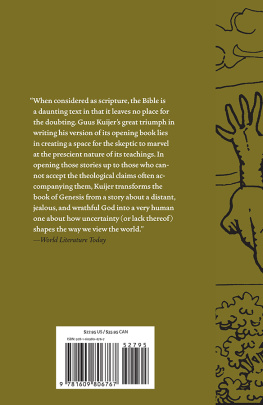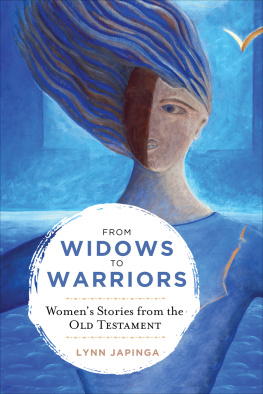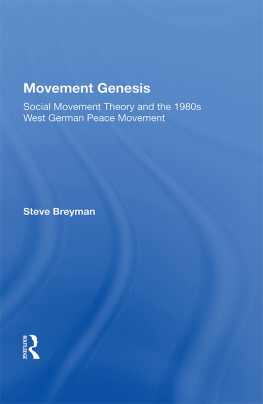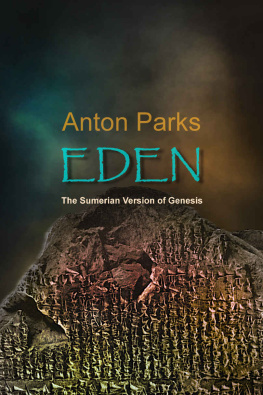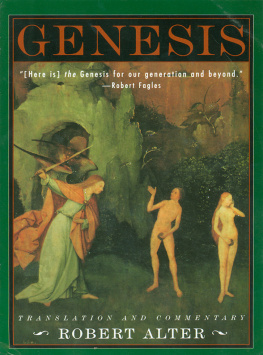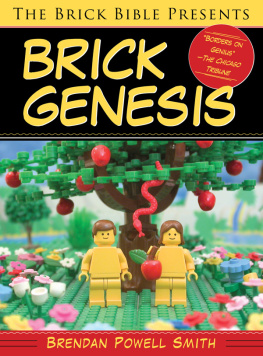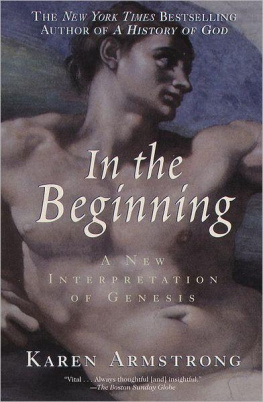Steven Rose - The First Book of Moses, called Genesis
Here you can read online Steven Rose - The First Book of Moses, called Genesis full text of the book (entire story) in english for free. Download pdf and epub, get meaning, cover and reviews about this ebook. year: 1999, publisher: Canongate Books, genre: Science. Description of the work, (preface) as well as reviews are available. Best literature library LitArk.com created for fans of good reading and offers a wide selection of genres:
Romance novel
Science fiction
Adventure
Detective
Science
History
Home and family
Prose
Art
Politics
Computer
Non-fiction
Religion
Business
Children
Humor
Choose a favorite category and find really read worthwhile books. Enjoy immersion in the world of imagination, feel the emotions of the characters or learn something new for yourself, make an fascinating discovery.
- Book:The First Book of Moses, called Genesis
- Author:
- Publisher:Canongate Books
- Genre:
- Year:1999
- Rating:4 / 5
- Favourites:Add to favourites
- Your mark:
- 80
- 1
- 2
- 3
- 4
- 5
The First Book of Moses, called Genesis: summary, description and annotation
We offer to read an annotation, description, summary or preface (depends on what the author of the book "The First Book of Moses, called Genesis" wrote himself). If you haven't found the necessary information about the book — write in the comments, we will try to find it.
Genesis covers some of the most famous stories of all time, including the garden of Eden, Noahs Ark and Cain and Abel. Using the emergence of the people of Israel as a starting point, it tells the story of the beginning of the world as ancient writers understood it. The text is introduced by Steven Rose.
The First Book of Moses, called Genesis — read online for free the complete book (whole text) full work
Below is the text of the book, divided by pages. System saving the place of the last page read, allows you to conveniently read the book "The First Book of Moses, called Genesis" online for free, without having to search again every time where you left off. Put a bookmark, and you can go to the page where you finished reading at any time.
Font size:
Interval:
Bookmark:
The Authorised King James Version of the Bible, translated between 160311, coincided with an extraordinary flowering of English literature. This version, more than any other, and possibly more than any other work in history, has had an influence in shaping the language we speak and write today. Presenting individual books from the Bible as separate volumes, as they were originally conceived, encourages the reader to approach them as literary works in their own right.
The first twelve books in this series encompass categories as diverse as history, fiction, philosophy, love poetry and law. Each Pocket Canon also has its own introduction, specially commissioned from an impressive range of writers, which provides a personal interpretation of the text and explores its contemporary relevance.
For me it wasnt Genesis at all but Berashis, in the Old Hebrew pronunciation with which the Torah the five books of Moses, or Chumash were chanted section by section in a ritual which took the entire synagogue year, Saturday by Saturday. And I sat at the back of the shul with the other boys, explaining why the Biblical version of creation had now been firmly put in its place by modern science. So when, aged eight and with a copy of Darwins Origin and a chemistry set, I felt able to declare my atheism, I ceased to pay any attention at all to the Bible either my bit, the so-called Old Testament, or the New. Not that I could really read Darwin then that was to come much later but I grasped, however childishly, his symbolic power as an alternative to the Bible story. If science was right, religion could not be, and I preferred white coats to black hats. The lab coat was to provide its route out of the close and foetid familial embrace, cloaked as it was in religious ritual. And so it has remained for me for the following half century. Did the editors of this series of volumes of the King James realise that I was an ex-orthodox Jew, an atheist and a biologist to boot when they suggested that I write this introduction? Yes, they said, and thats why we asked you. So now, nudging sixty, I have read King Jamess Genesis for the first time.
Of course, in a sense none of us ever reads it for the first time; so much of the Biblical account, and its sonorous English text, is familiar. Its stories are of course central to Jewish, Christian and indeed Islamic traditions, but perhaps surprisingly its claims as to who we as humans are, and our complex relationships to nature including our own, human nature underlie many of the presuppositions of our assumedly post-religious, rationalist and reductionist modern science, however forcefully we dismiss the Biblical version of creation. So the militant atheism of my youth has been tempered by a recognition that science too has its problems. White coats, as much as priestly robes, crucifixes and mogen davids, can be bloodstained.
The Creation, Eden, Adam and Eve, the Fall, Cain and Abel, the Flood and Noahs Ark, Babels tower, Abraham and the sacrifice of Isaac, Jacob and his ladder, Sodom and Gommorah, Joseph with his Coat of Many Colours and with Potiphars wife Pharoahs dream of the seven fat and seven lean cattle. The images speak to us through centuries of painting, sculpture, novels and poems, to say nothing of mountains of learned commentaries and exegeses. And all within 65 pages (in the standard editions of the Bible). A miracle of terse story telling yet these familiar episodes form only part of a text full of tales of murder, incest and adultery and of apparently God-sanctioned tricks, by father on son and son on father, brother on brother, nephew on uncle.
Seemingly random collections of often elliptic stories interspersed with columns of obscure images whose interminable detail almost drowns the rest. Creation may have taken God six days; the text deals with it in 31 short paragraphs. By contrast the complex sagas of the travels, loves and lusts of cunning Jacob and later of his virtuous and put-upon, but ultimately successful, son Joseph take up virtually half the book.
For modern fundamentalists who take each sentence literally, as in the days when Archbishop Ussher could calculate from the lineages that the Creation could be dated precisely to 4004 BCE , these diverse and disjointed episodes continue to occupy many Casaubon-years of study and analysis. If we see them as modern Biblical scholars do, as accretions of early Mesopotamian and Egyptian myths and sagas, read into a single and reasonably coherent narrative in order to provide a history for a particular group of initially nomadic, later sedentary shepherds and pastoralists, non-believers like me would do better to pass them by, and focus instead on those themes which still have resonance today. What follow then are my personal reflections though reflections which owe unacknowledged debts to many contemporary philosophers, sociologists and scientists on the central themes of those 65 pages.
I write as a biologist, but I am not concerned here to take issue with those who argue for those travesties of science called Creationism, nor with those who send me learned tracts proving that Noahs flood really occurred and that the remains of an ark (big enough doubtless to hold exemplars of all of the upwards of 14 million known species of life on earth two of each of the unclean and seven of the clean, presumably plus survival supplies of appropriate food) have been discovered by archaeologists on Mount Ararat. I am content to leave such disputations to others. Nor do I need to prove the fact that species have evolved, albeit by a multitude of mechanisms of which Darwinian selection is but one, or to reflect on the limited state of genetic knowledge and selective breeding practices which led to Jacobs spotted sheep. Instead, I focus on the vision of the world and humanitys place within it offered by the story of the Creation, Eden and the Fall.
First and foremost, the Creation itself. In the beginning, Genesis tells us, God created the heaven and the earth, a creation from nothingness, a nothingness not perhaps so conceptually different from that offered by modern cosmologys Big Bang. Nor, for that matter, is the sequence of creation, culminating in that of humans, so different from that proposed by modern cosmology, if we ignore the timescales. If we today have better grounds for believing that provided by cosmologists rather than the Biblical account, we should also not forget that the basis for scientific knowledge remains doubt, not certainty. It is just that as scientists we are allowed to answer questions like What came before the Big Bang? by saying We dont know rather than God did it. For some this statement of ignorance rather than faith may be threatening; I myself dont find it so.
After heaven and earth, light and dark, plants and animals, comes the creation of humans in chapter 1, male and female together, in chapter 2 the more familiar version in which, as in so many other of the worlds creation stories, man is created out of clay (the dust of the earth) and the breath of God, and only later woman as a companion and helpmeet. Making objects from clay was one of the earliest of human technologies and analogising the act of human creation to that of the potter begins a tradition of attempting to understand living processes via technological artefacts which continues today. A modern-day God would perhaps take a computer and breathe consciousness into it.
And creating Eve after Adam as opposed to the earlier versions, in which Adam and Lilith were co-equal establishes the hierarchy of the genders which persists despite the feminist challenges to the present day. As Milton puts it in Paradise Lost, Adams task is to serve God, Eves God through him. Further, and unequivocally, God gives Adam dominion over all other living creatures by inviting him to name, to control and to own them. This belief in humanitys right to tame and dominate Nature, to transform the world according to our perceived need, has been largely if not entirely unquestioned until recent times by the various religions of the Book. Belief in this right has also been central to Western science from its origins in the protestant and emergent capitalist societies of north-western Europe in the 17th century up until todays secular society. Read anyone from Francis Bacon to James Watson, the co-discoverer of the structure of DNA , and the unquestioned technological imperative shouts from every page. Hence perhaps the attempts amongst the present-day ecology movements, with their contrasting ethos in which humans live harmoniously with Nature, to seek support from the traditions of other, non-Western, religious forms.
Font size:
Interval:
Bookmark:
Similar books «The First Book of Moses, called Genesis»
Look at similar books to The First Book of Moses, called Genesis. We have selected literature similar in name and meaning in the hope of providing readers with more options to find new, interesting, not yet read works.
Discussion, reviews of the book The First Book of Moses, called Genesis and just readers' own opinions. Leave your comments, write what you think about the work, its meaning or the main characters. Specify what exactly you liked and what you didn't like, and why you think so.

